On Friday January 31st, one of my favourite shows ended. The back half of the sixth season of BoJack Horseman was dropped on Netflix, and it’s really hard to sum up exactly what that means to me.
For the very few uninitiated, BoJack Horseman follows the adventures of an anthropomorphic horse in a world where animal-human hybrids coexist with humans. It was created by Raphael Bob-Waksberg, who was inspired by sketches by his friend Lisa Hanawalt, who became the production designer of the show as well as a producer (incidentally, her own show Tuca & Bertie is also excellent and tragically short-lived). BoJack was once the star of Horsin’ Around, a cheesy late-80s/early-90s sitcom about a wise-cracking horse looking after three orphans. His lack of life direction after the show’s cancellation, combined with other mental and emotional traumas, turn him into a cynical, jaded alcoholic.
The series starts off as a farcical adult comedy lampooning the shallow excesses of Hollywood through a character both inside enough to feed off said excesses to finance his hedonistic, meaningless existence, but outside enough to be self-aware of how incredibly phoney it all is and more than willing to call it out. That’s not how it ends, even in its first season. It quickly morphs into a character study that looks into meaning, trauma, abuse and the unending pursuit of happiness. It’s similar to another animated show, the stop-motion shorts series Morel Orel, but what I think distinguishes BoJack is that it balances this with its whacky absurdist humour way more efficiently (p.s. Morel Orel is great and is another show I’d love to explore more in-depth). It helps even out the tragic and incredibly bleak drama better, while still giving it room to be profound and human.
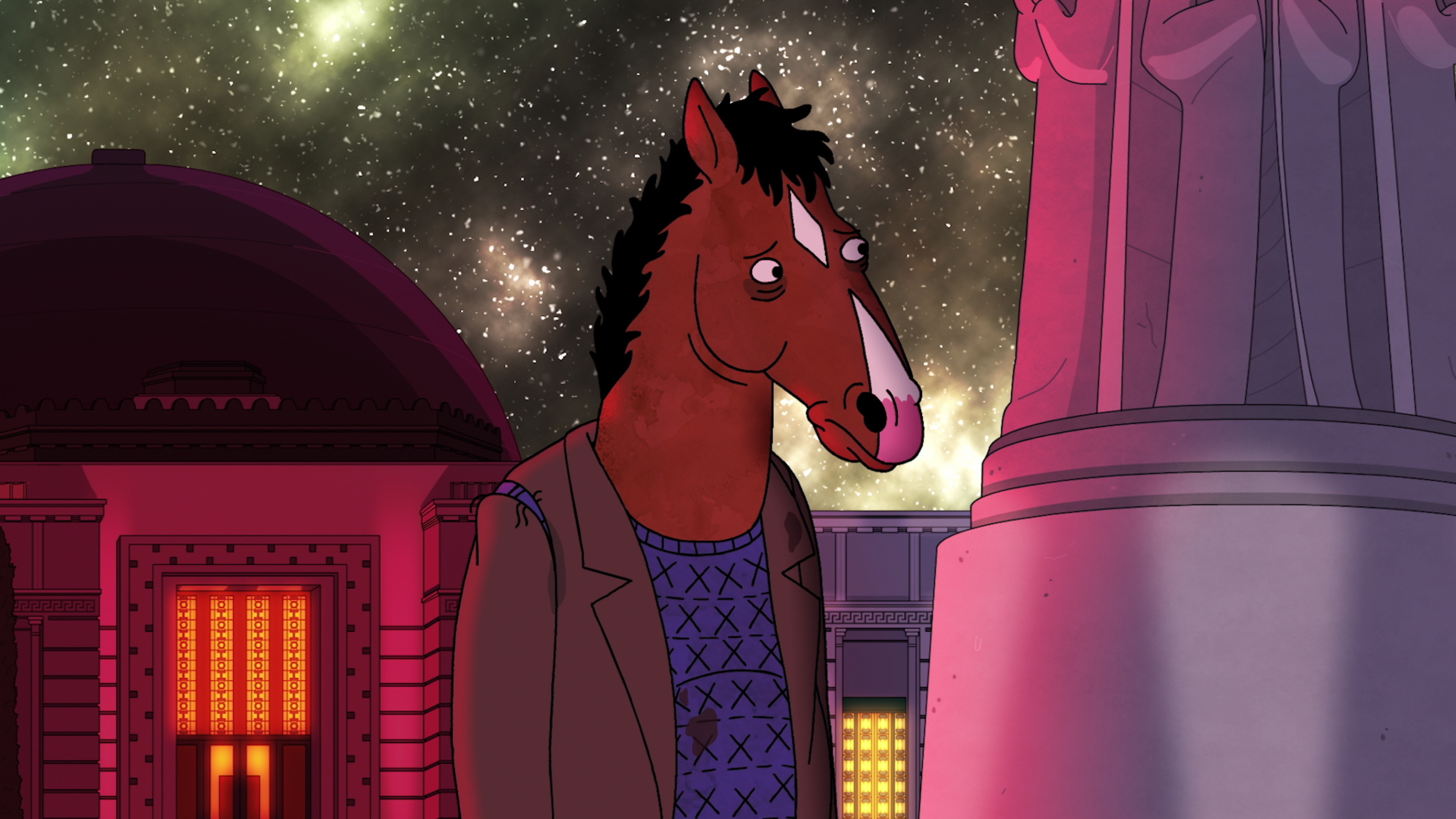
(also from this point on this becomes less uninitiated-friendly, so lemme just tag on a big aul SPOILER WARNING!!!!! for those reading and having not caught up with the series thus far. It’s all on Netflix, you won’t regret it)
It would be easier to just do a series overview and explain exactly why this show is so great, because you could talk about BoJack for the end of time and never run out of things to say. Instead, I want to go a little more personal and go into how the show impacted me on a more emotional and mental level; the life lessons I took from it. Maybe you did too-as Todd says, art is less about what people put into it and more what they get out of it. Here are a few things I got out of this show:
The Pursuit of Happiness and Personal Growth is Long, Arduous and Every Goddamn Day

“It gets easier-Every day, it gets a little easier-But you gotta do it every day. That’s the hard part. But it does get easier.”
“It takes a long time to realise how truly miserable you are, even longer to see it doesn’t have to be that way. Only after you give up everything can you begin to find a way to be happy.”
BoJack spent most of his formative years on television, after a childhood/adolescence of being told constantly he’s worthless and broken. Because he was in a rather simply formatted sitcom with a kitschy happy ending at the end of every episode, he’s internalised this need for life to have easy, resolute solutions, because it means his suffering has a point. He’s not the only one who thinks this-we have Diane trying to externalise her trauma to make it have a point, ironically someone who grew up comforted by BoJack’s show.
I think all of us, at some point in our lives or other, had a goal. We knew when we got to that point our lives would be complete and we’d be happy. Two things inevitably happen here: either you don’t reach your goal and punish yourself continuously for this, or you do and it just does not fulfil you in the way you imagined it would. Because the pursuit for that contentment and/or personal betterment is a fantasy. It’s not something you can just switch like a light once you accomplish something professionally and personally. You need to take responsibility for your own happiness, even if you can’t be responsible for your own breakfast.

Our happiness and contentment are not set goals that just mark us off as “The Happy” once they’re fulfilled. It takes a lot of hard work and a step every day to reset our brains into making us not feel empty or like shit as has been our default since before that point. This way you just won’t automatically give up at the first hurdle, because failure is a massive part of recovery when you spent your whole life defaulting to utter misery.
But this doesn’t mean you overhaul your personality and be a happy, giving joy-joy person all the time. Mister Peanutbutter is a great counter to this-he’s consistently chirpy and positive to everybody he meets, but it’s because he strives off people liking him and never allowing any negativity enter his life. It’s a huge part of his self-esteem, and it consistently leads to his relationships falling apart and having a complete lack of self-awareness about what he needs to be a fully contented adult.
Misery is easy to fall into, happiness takes effort, you’ve got to work around how it makes sense to you and what will need to tackle what makes you so unable to reach that. Because finding and tackling the source of that misery is not an easy task.
Trauma is Cyclical, and It’s Difficult to Break

“Your father and I, we-well, you come by it honestly, the ugliness inside you. You were born broken, that’s your birthright. And now you can fill your life with projects, your books, and your movies and your little girlfriends, but it won’t make you whole. You’re BoJack Horseman. There’s no cure for that.”
“You know what the shittiest thing about all of this? When that stranger behind the counter gave me that free churro, that small act of kindness showed more compassion than my mother gave me her entire goddamn life. Like, how hard is it to do something nice for a person? This woman at the Jack in the Box didn’t even know me. I’m your son. All I had was you.”
Family plays a huge role in BoJack, especially for the horseman himself. His parents were unhappy, broken people who projected their misery and hatred for each other and themselves onto their son. That would just be the end of it-BoJack pushes back and ruins others’ lives because of the shitty upbringing he had. However, of course, it’s not that simple. We find out a lot about Beatrice’s upbringing-the horribly cold way her father raised her, and her mother being lobotomised and telling her never to love.
This issue is so prevalent to the series it affects every main character. Princess Carolyn is a compulsive problem-solver and busybody because her lazy alcoholic mother forced her to look after her family at a very young age. Todd’s wayward, directionless existence and self-worth issues were exacerbated by his mother kicking him out of his house. Mister Peanutbutter is the inverse case: his self-esteem is entirely attached to constant positivity and a need to be loved because he was in a household that was overly upbeat and way too reliant on ignoring darker issues (like telling him his parents were going to a farm when they died).
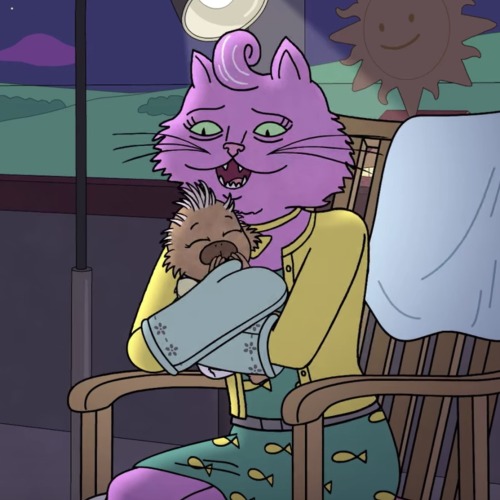
Diane is probably the most tragic example next to BoJack. Her entire family, especially her father, bullied and belittled her and utterly destroyed her self-esteem and ability to trust happiness. When you grow up nurturing toxicity, any idea that you could be happy is treated with extreme hostility. She carried that burden and lingering resentment in a form of self-loathing, and her arc is about trusting that her family were wrong in how they treated her.
The negativity we’ve absorbed from our past, our upbringing, or from any traumatising experience has a way of influencing our actions. Even if we fight against it, even if we’re not conscious of it. It’s important to isolate the source of that and not let trauma absorb you and leave you a toxic husk. This work is never easy-it takes people their entire lives and a lot of times they don’t win. But creating a space where that toxicity doesn’t foster and take shape, no matter how difficult it can be to manage that, will help reshape you and make you feel contented with the life you have.
Of course, just because you grew up with shit doesn’t mean you get to be shit. For you see:
You Can Acknowledge a Person’s Damage, But it Doesn’t Absolve the Consequences of Their Terrible Behaviour
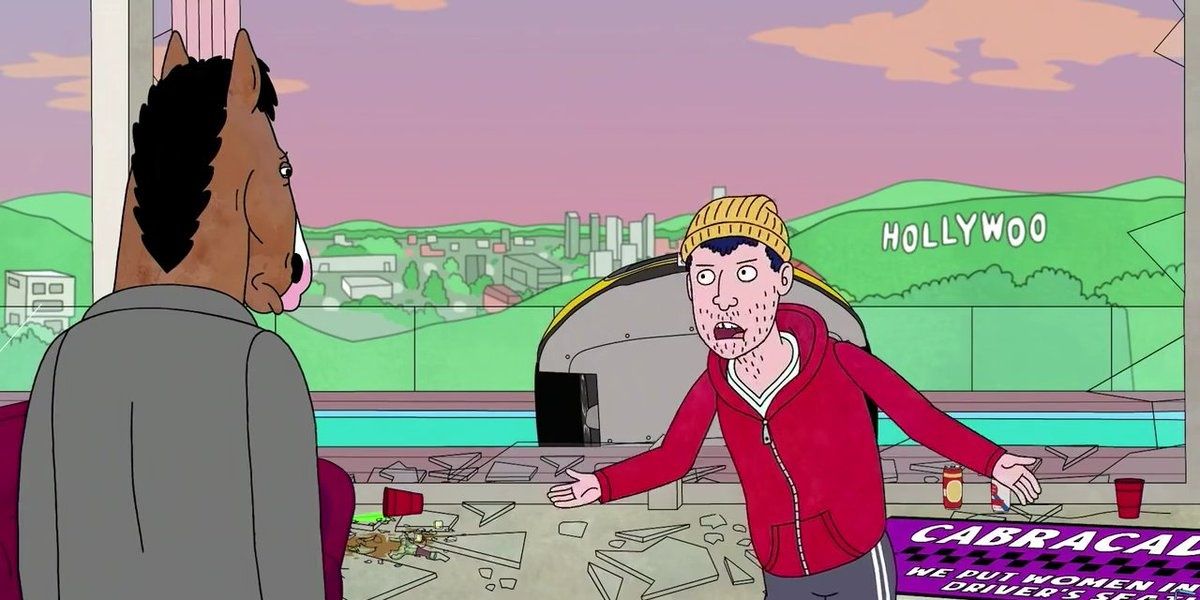
“Because at some point, I realized it wasn’t the alcohol’s fault, or Maddy’s fault, or my fault. It was just some shitty dude, you know?”
“You can’t keep doing this! You can’t keep doing shitty things, and then feel bad about yourself like that makes it okay! You need to be better!”
BoJack’s actions are very well characterised. They make sense and come from a place that springs naturally from the narrative. But it does not justify his terrible decision and the hurt he inflicts with his choices throughout his life. And the show is very, very careful not to make him so sympathetic to the point where you can overlook his massive damages and the shit he puts onto others.
One of the things is just how well defined his abuses are. This becomes more apparent as the seasons go on and BoJack is forced to face with the consequences of his actions. The spectre of Sarah Lynn haunts the final season, even with the planetarium sky in the opening credits. Probably the most important episode in season 6 is A Quick One While He’s Away, because it demonstrates the damage BoJack left on the women in his life. And, before this, he got away with it outside of his own self-loathing.
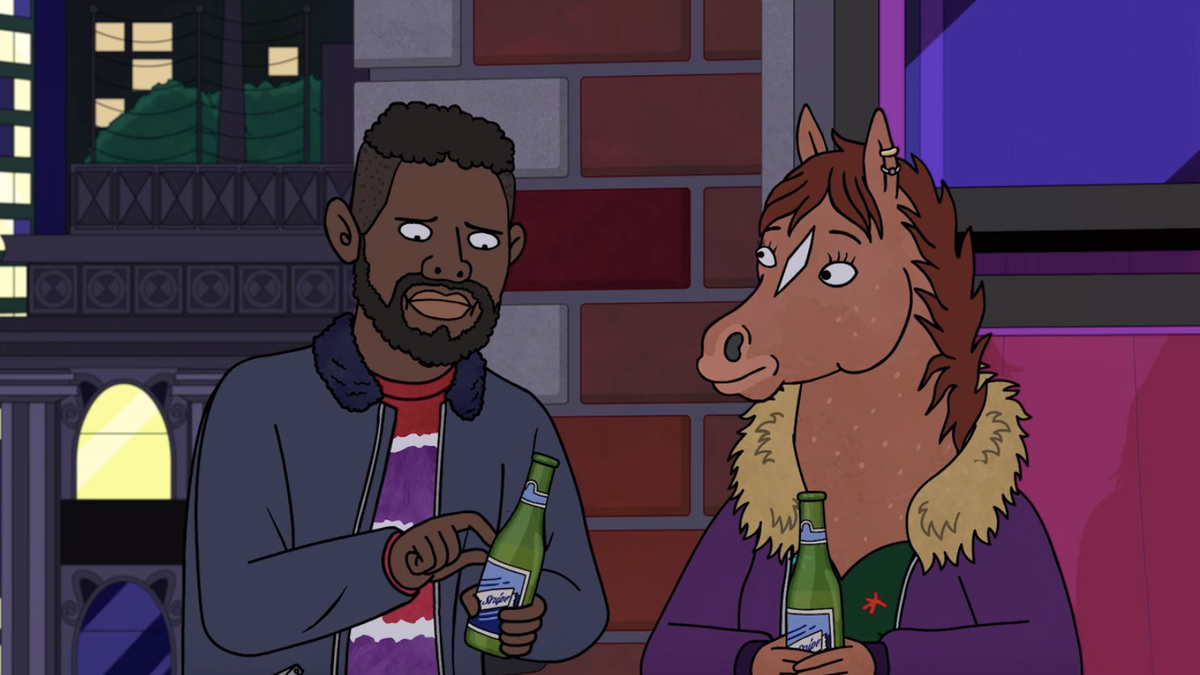
So, just cancel him, that will solve everything, right? Actually, no. One of the most difficult things to face is that just removing these toxic individuals may not be the solution either. I mean they should be removed from where they can cause harm-that goes without saying-but the consequences to victims and innocent people is heavily considered on the show. In season 5, BoJack stands against Flip’s sexist notions, and he ends up firing women who were gonna be in a stripper scene. In the finale, the notorious sleazebag Henry Fondle is fired and a lot of people lose their jobs. Outing BoJack brings the people he’s hurt rather harshly into the spotlight.
And I don’t think the show is saying “Forgive terrible people because they want it” and washes its hands. Atoning is hard, you may never be at the place you were where people trust you and that’s just something he has to deal with. But even that may not be the perfect example-we see Vance Waggoner, a man who has been given several chances and refuses to change. It’s hard to trust that he will change, but it’s hard to know if the effects of his damage can ever be erased. And that’s the rub of it-this shit stays with you, even if you’re apologetic. Sarah Lynn’s dead, and is just another victim in the BoJack Horseman story.
It’s important to know where this damage comes from and to properly stop its corrosion. Keeping him out of the Hollywoo lifestyle would help, it just convinces him he can do whatever he wants and get back in the spotlight eventually, and for BoJack specifically it’s obviously a terrible influence. The spotlight allows him to bathe in his ego. Whatever the case, atonment starts with taking responsibility for your actions, because otherwise you’ll continue to make excuses for the person you are. Recovery involves facing the person you are and seeing the person you can be. But it’s only the start.
Maybe BoJack will get better and be a better person. He won’t use his guilt or shitty past to make excuses for his lack of growth, and actually turn around and be a compassionate, empathetic, healing presence in the lives of the people who know him. But does that make up for the shitty things he’s done? I don’t know.
But I do know one thing:
Life Continues, and You Never Know What’s Next
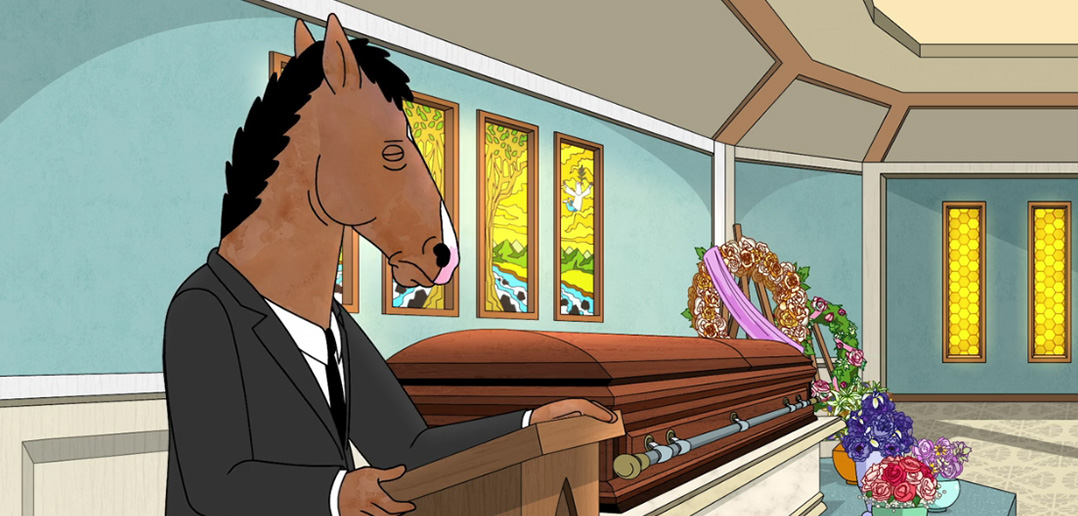
“There’s always more show. I guess until there isn’t.”
“Sometimes life’s a bitch, and then you keep on living.”
One of my favourite quotes from Neil Gaiman’s Sandman is in a moment where beloved character Death takes a man with an extended lifespan of 15,000 years to the other place. He’s facing the view from halfway down, you could say. Clearly panicking, he says he had a good run considering how long he’s lived. Death responds “You got what anybody gets…you got a lifetime. No more. No less”. That, to me, sums up what’s great about BoJack Horseman. To me, it’s more than just being about depression, as important a theme that is. It’s about a existentialism and purpose.
I think this show gets the constant struggle to find acceptance of life’s constant shit better than a lot of others. And there’s no artificially positive resolution given by the final two episodes- it’s not about seeing the joy, it’s about living through the bleak emptiness in parts. The artificiality of the Hollywoo/b system perfectly plays off this idea that finding purposeful truth in this existence can be daunting and terrifying. Buying into this propped up bullshit that you benefit off if you’re successful is just easier, and that’s what BoJack tolerated about his own existence, until he reflected upon it.

This applies to all the characters. Princess Carolyn longs to find a work/life balance as she believes both give her purpose, despite the former blowing up the latter a lot. Mister Peanutbutter thoughtlessly giving into Hollywoo/b’s artificial positivity consistently stops him from finding real, meaningful, lasting purpose. Todd tries to find purpose by just living life as it comes, but is forced to etch out one when confronting his sexuality and directionless existence. But this is probably the healthier option to fight the ever-growing dread of purposelessness. There are the options the other characters take.
TW/CW: I talk pretty openly about suicide and suicidal ideation
BoJack is a pretty self-destructive character, we see it throughout the series. A lot of this is an extreme manifestation of his own self-loathing and emotional trauma, but he also has no real solid grounding. All he was was a star of a famous sitcom 20 years ago, and it inflated his ego so badly he cannot find contentment in any reasonable way. So he lashes out, sometimes to the point where he risks taking his own life.
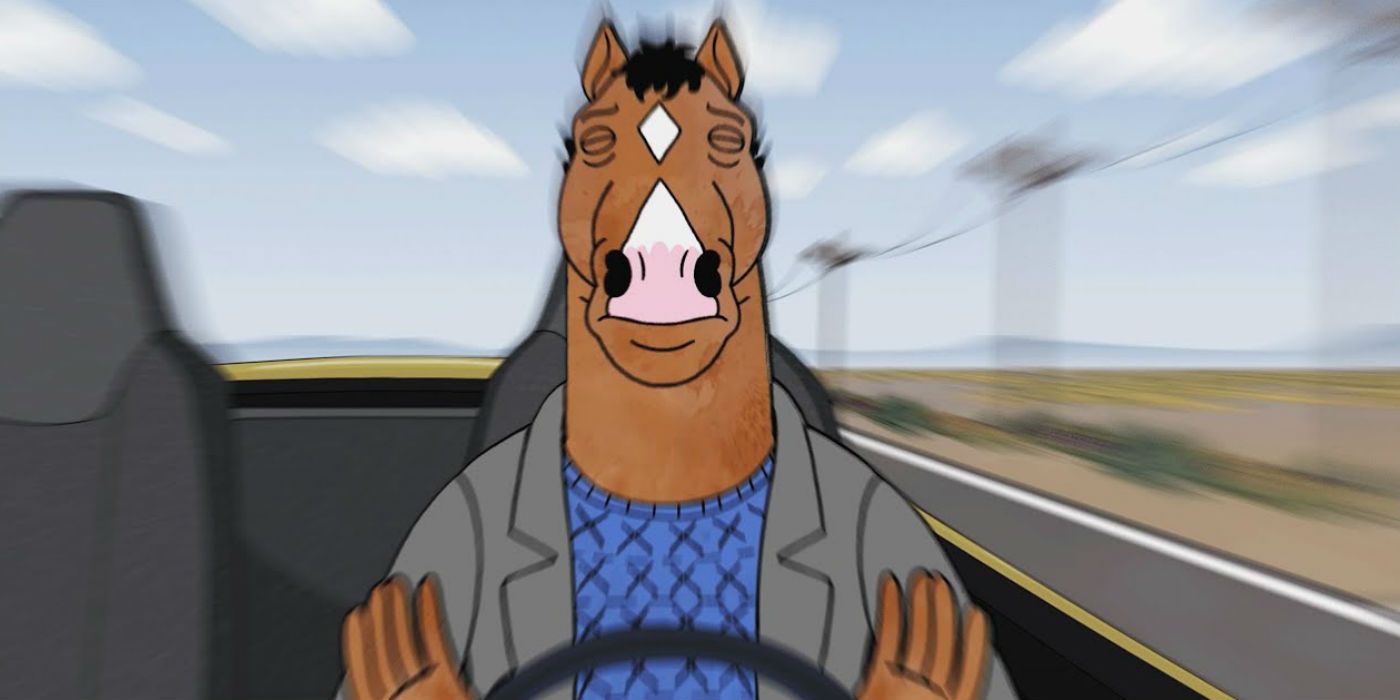
It’s that lack of a foundational measure for stability that drives him, once literally into his own pool. Water and drowning are a recurring motif, and they fit very well with BoJack’s character. He’s consistently overcome and enveloped by the broken sense of self-worth and pain he carries, to the point where he wonders if the tide should take him. And it nearly did a few times, most potently in the penultimate episode A View From Halfway Down.
What I took from that episode was that it was not worth him facing that other side, that life still had a meaning to him, some meaning. And I cannot speak for anyone who’s ever attempted to end their own life, but that sense of calm and peace can be overwhelming at points. Look at the poem that the episode gets it’s title from:
Toes untouch the overpass
Soon he’s water bound
Eyes locked shut but peek to see
The view from halfway down
A little wind, a summer sun
A river rich and regal
A flood of fond endorphins
Brings a calm that knows no equal

There’s a sense of clarity, almost an ease. It’s not saying that suicide is the answer, but the series is empathetic enough to understand why somebody may think that. And then we get to the rest of the poem, which I won’t transcribe in full but take a line or two:
All I’d give for toes to touch
The safety back at top
But this is it, the deed is done
Silence drowns the sound
Before I leaped I should’ve seen
The view from halfway down
And that’s the thing. You never know what’s next, including when you die. After all this, after all this pain, living to figure out what’s next is all the motivation you need to swim back to shore. It’s not always about making the rest of your life a happy wonderland. Sometimes it’s about making it to tomorrow.

Let’s look at Diane, who has a lot in common with BoJack. The reason they relate so well is that they have the same lack of foundation. Both were left emotionally crippled and unable to reach that sense of life fulfilment because of their toxic upbringing. But Diane never had that intoxicating hit of fame that BoJack did, so her self-loathing is a lot more internal and she’s not as destructive. Yet she reaches a point where she tries to fade away or self-sabotage herself into a furthering depression. She implodes where BoJack explodes.
Where does she find respite? Not from trying to save the world in Cordovia. Not from embracing the LA lifestyle. Not even from writing a book of memoirs where she relishes her own emotional damage. No-a teen novel series. Something she never realised would reach so many people and make a difference. A man who respects her issues but doesn’t let her wallow in her own misery or just ignorantly hope for the best always. This wasn’t the life she wanted, but if she stopped there when her self-hatred and mental fatigue broke her down, she never would have got the life she had. A life where she can begin to trust in her sense of security. One without BoJack.
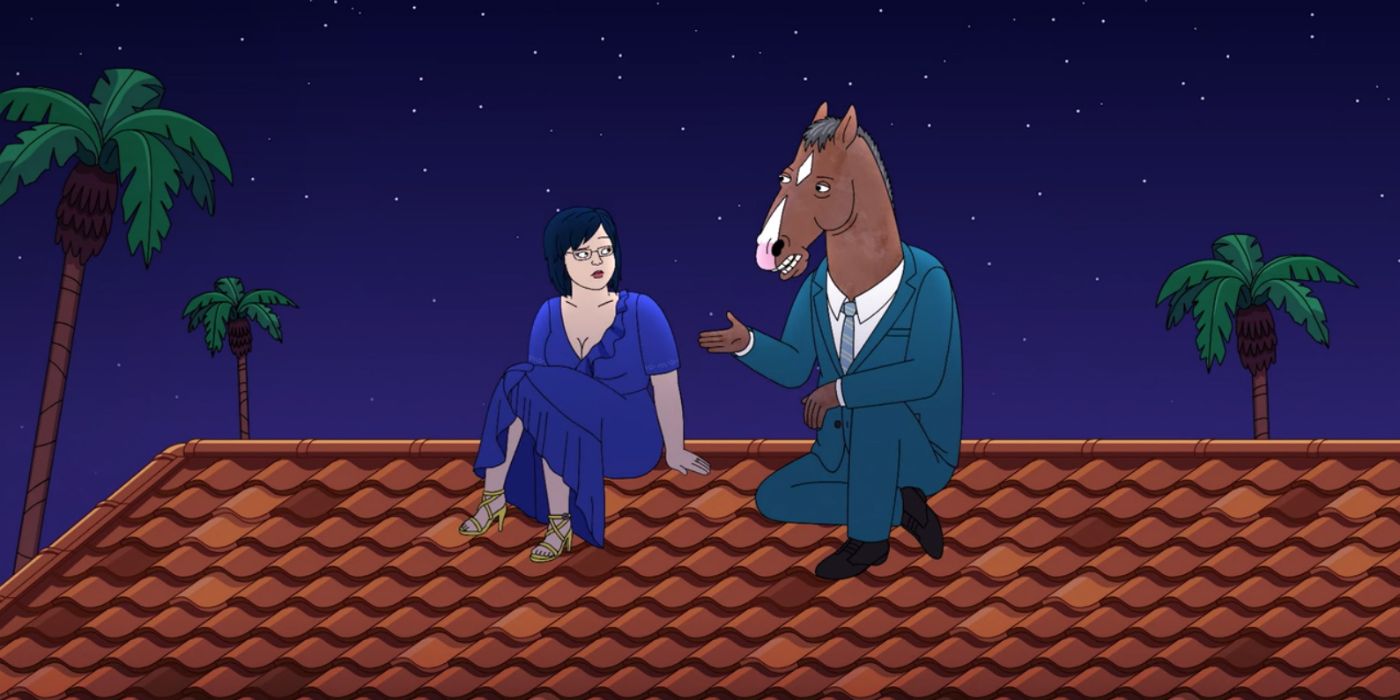
And that’s a final lesson BoJack taught me: our connections are fleeting, hard to keep, but important. The final scene is our two leads who worked the hardest to find purpose in life. Diane found hers, at least for now, at least something she could work on to find that sliver of happiness. But she needs to make a break, from LA and from certain negative fixtures in her life. And it took BoJack drowning (literally) in his to push out of her comfort zone and realise this relationship was not healthy, but it meant the world to her. To both of them.
Life is fleeting, cruel, and unpredictable, but it’s worth it to reach that next stage. To get your shit together, to do the hokey pokey. To sit on a roof with somebody you love and cherish, even if you know in your heart of hearts this is the last thing ye will say to each other. Because it’s our connections, our hope and our actions while being here that give life its meaning, and it’s what gets you through the dark times. Which are numerous, and overwhelming, but it’s important to push through them. It was important for BoJack to push through them, which allows him this exchange with a dear friend:
“Anyway, I’m glad you’re alive.”
“I am, too.”
It’s a small admission, but a happy one. Diane I have confidence will stay on her feet. BoJack I’m not as sure of. But the important thing is we don’t know as they look up into a clear night’s sky, one that both characters may not have been able to see for quite some time.
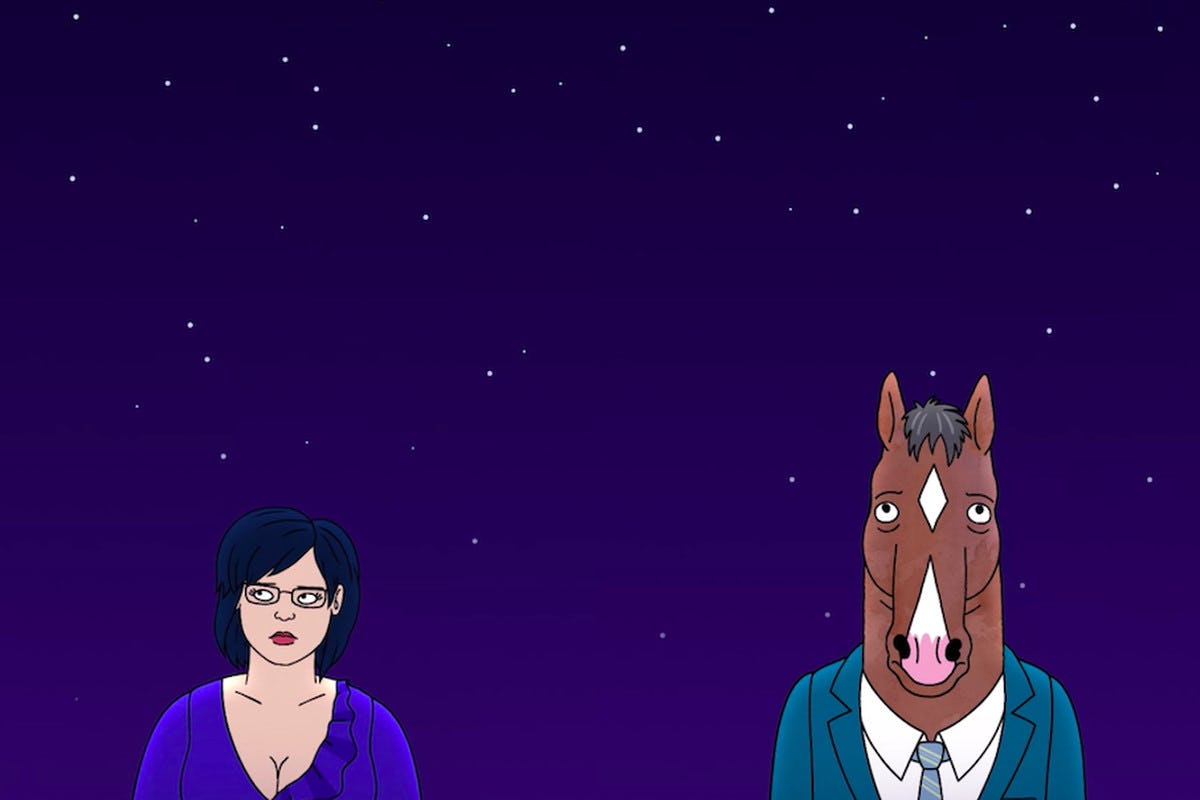
So that’s what BoJack taught me. What did it teach you?
Social media shiz: Facebook Twitter
